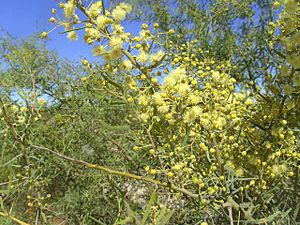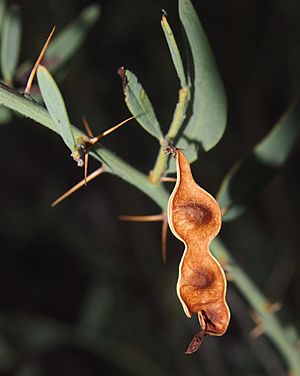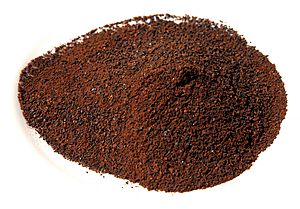Gundabluie facts for kids
Quick facts for kids Gundabluie |
|
|---|---|
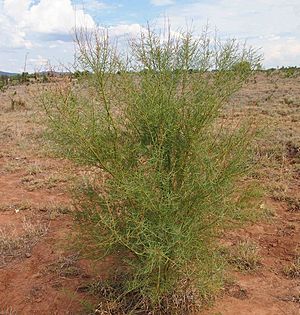 |
|
| Scientific classification |
|
| Kingdom: | Plantae |
| Clade: | Tracheophytes |
| Clade: | Angiosperms |
| Clade: | Eudicots |
| Clade: | Rosids |
| Order: | Fabales |
| Family: | Fabaceae |
| Clade: | Mimosoideae |
| Genus: | Acacia |
| Species: |
A. victoriae
|
| Binomial name | |
| Acacia victoriae |
|
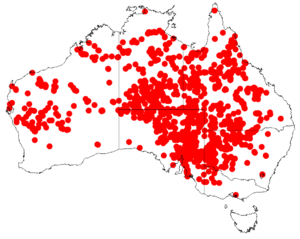 |
|
| Occurrence data from AVH | |
| Script error: The function "autoWithCaption" does not exist. | |
| Synonyms | |
|
|
Script error: No such module "Check for conflicting parameters".
Acacia victoriae, also known as gundabluie or bardi bush, is a special type of shrub or small tree. It grows naturally in Australia. This plant is known for its tough nature and useful seeds. There is also a specific type of this plant called A. victoriae subsp. arida Pedley.
Contents
Where Does the Elegant Wattle Grow?
The Elegant Wattle is found all over Australia. It prefers dry and semi-dry areas. You can often see it growing in soils that are a bit salty or have a lot of clay. This includes places like floodplains, rocky hills, and ridges.
This plant is important for many animals. Birds and small mammals use its branches for shelter and protection. The seeds and leaves also provide a good food source for them.
What Does the Elegant Wattle Look Like?
Mature Elegant Wattles usually grow as a shrub with many trunks. They can reach a height of about 5 to 6 meters (about 16 to 20 feet). These plants grow quite fast. They typically live for about 10 to 15 years.
The Elegant Wattle has a very large root system. Its roots can spread out up to 20 meters (about 65 feet) underground! This helps the plant survive in dry conditions. It can handle droughts pretty well, but not very severe ones. If it gets too dry, it can still grow back from its roots.
Flowers and Seeds
The branches of the Elegant Wattle have small spines. These spines are about 1 centimeter (less than half an inch) long. When the plant flowers, its branches are covered in yellowish, strong-smelling flowers. These flowers grow in clusters that are about 1 to 2 centimeters (less than an inch) wide.
After flowering, the plant produces pale-colored pods. These pods are about 8 centimeters (about 3 inches) long. Inside the pods are small, brown seeds. Each seed is about 0.5 centimeters (a quarter of an inch) in size. The flowering season usually starts in August and lasts until late December. The exact timing depends on where the plant is growing.
How People Use the Elegant Wattle
Food Source
The seeds of the Elegant Wattle are very useful! They contain a lot of protein. People can grind them into a meal or use them in breads. Indigenous Australians have traditionally used these seeds for food. They are also a good source of food for animals, like livestock.
Helping the Land
The Elegant Wattle is also great for the environment. It can be planted to create a windbreak, which helps protect other plants and soil from strong winds. It also helps to keep the soil in place, preventing erosion. Because it grows moderately fast, it's often used to help damaged land recover.
 | May Edward Chinn |
 | Rebecca Cole |
 | Alexa Canady |
 | Dorothy Lavinia Brown |


